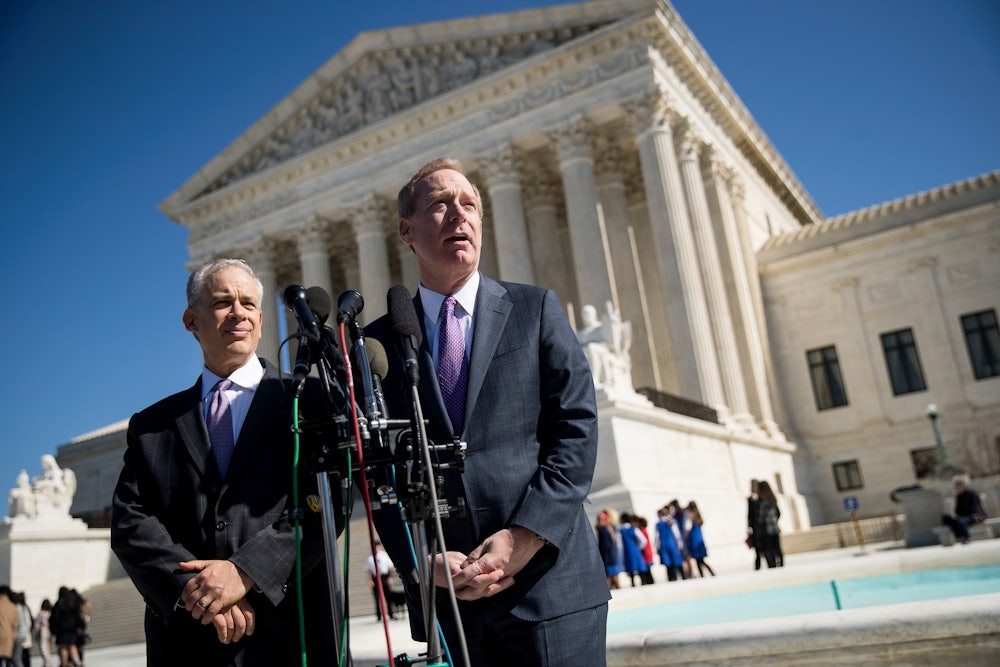Most people consider the internet’s global reach an advantage. But for the Supreme Court on Tuesday morning, it was more of a headache.
The justices heard oral arguments in United States v. Microsoft, a high-profile case about digital privacy and law enforcement. At issue are dueling interpretations of an outdated federal statute that still governs how tech companies store and release private information to law-enforcement agencies. Those arguments took place against the backdrop of a broader debate about how to apply U.S. law to a supranational network of computers.
The underlying legal dispute began in 2013 when federal investigators obtained a warrant under the Stored Communications Act of 1986 for a Microsoft customer’s email account as part of a drug investigation. Some of the email account’s data are stored in the United States. But the emails themselves reside separately on servers inside a Microsoft data center in Dublin, Ireland.
Microsoft turned over the U.S.-based data but then asked the courts to quash the government’s request for the Ireland-based emails. The tech giant argued that Congress didn’t write the Stored Communications Act to apply within other countries and that, accordingly, the warrant request was improper. After the Second Circuit Court of Appeals agreed with Microsoft’s position, the Justice Department asked the Supreme Court to intervene.
Both sides agree that the Stored Communications Act can’t be enforced in a foreign country. Where the two sides diverge is on whether Microsoft would have to take action overseas in order to acquire the emails in question. Since Microsoft can access them from its facilities in the United States, the government argues that the issue is entirely a domestic matter.
“There is not an international problem here,” Deputy Solicitor General Michael Dreeben told the justices. “This is largely a mirage that Microsoft is seeking to create.”
For the court’s liberals, that view seemed to go beyond what legislators intended when they crafted the 1986 statute, which focused on domestic data-storage issues and did not anticipate the volume of personal information that would be kept by tech companies or the borderless world of cloud computing. “Things have changed,” Justice Sonia Sotomayor told Dreeben. “But what you’re asking us to do is to imagine what Congress would have done or intended in a totally different situation today.”
Microsoft argued that the emails themselves—those particular ones and zeros inscribed on a hard drive in Dublin—are physically located at its data center abroad, placing them under foreign jurisdiction. This puts the emails beyond the reach of a warrant issued under the Stored Communications Act, the tech giant argued.
Joshua Rosenkranz, who represents Microsoft, acknowledged that the company can access the emails from the United States. But, he explained, the technical process to do so asks a computer in Ireland to read those ones and zeros so the data can be sent “on hard wires and over the Atlantic.”
“This is a quintessentially extraterritorial act,” Rosenkranz added.
But where the liberal justices expressed concern over applying a dated statue to a hyper-modern circumstance, some of the conservative justices were clearly concerned about not applying the statute. “There is nothing under your position that prevents Microsoft from storing U.S. communications, every one of them, either in Canada or Mexico or anywhere else, and then telling their customers: Don’t worry, if the government wants to get access to your communications, they won’t be able to,” Chief Justice John Roberts told Rosenkranz.
Rosenkranz replied that it was more likely that criminals who wanted to evade the U.S. government would choose tech providers with no footprint at all in the United States. “If customers do not want their emails to be seized by the government, they don’t use Microsoft’s services,” he told the chief justice.
Justice Neil Gorsuch, the court’s newest member, stuck to his usual habit of asking questions about the precise language of the legislative text at issue. At one point, he pressed Dreeben on the statute’s use of the word warrant, “which typically has a very limited and narrow understanding territorially,” he said, versus its use of subpoenas, which would be easier for the government to defend.
Gorsuch’s predecessor, Antonin Scalia, occasionally acted as something of a wild card on Fourth Amendment issues, joining with the court’s liberals on cases involving DNA searches during arrest and drug-sniffing dogs near a home. There were some hints during earlier oral arguments this term that the court’s newest justice might play a similar role, and his questions Tuesday seemed to support that notion. The Microsoft case hinges on the statute’s language, not a Fourth Amendment issue, but it could still be an interesting window into how Gorsuch balances privacy interests and law enforcement.
Sotomayor and Justice Ruth Bader Ginsburg asked both sides whether the issue should be left to Congress instead of the court. Members of the court’s conservative wing, like Justices Samuel Alito and Anthony Kennedy, however, seemed more inclined to rule in favor of the government’s position.
Complicating matters is the Stored Communications Act itself, which Congress passed almost a decade before the internet started to become a ubiquitous feature of modern life. The rapid pace of change since then means the statute’s parameters are an awkward fit at best for current technologies.
Microsoft and the government agree that the statute should be rewritten. And a bipartisan group of legislators is currently pushing for a bill titled the CLOUD Act to address the underlying issues in the Microsoft case and similar ones. At the same time, that bill’s language has sparked concerns among civil-liberties groups and digital-privacy advocates, who say the revised law would weaken existing protections.
A final decision on Microsoft is expected by June. In the meantime, the court will have to interpret a Bronze Age law for an Iron Age world.
Update: A previous version of this article stated that the Microsoft customer in this case lived in the U.S. His place of residence has not been disclosed.
